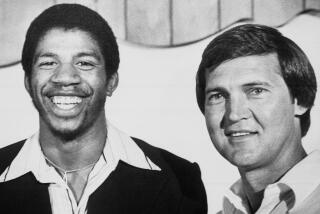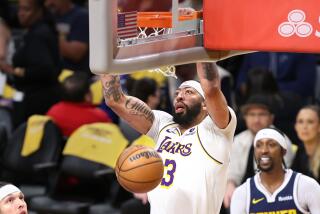Rockets Are Doing Unto Lakers. . . : NBA playoffs: Houston’s plan to double-team Magic Johnson looks a lot like the L.A. strategy against Olajuwon. And it’s working.
- Share via
HOUSTON — Their defensive strategy has been to double-team the big scorer, use physical force on him when necessary and, essentially, try to disrupt and frustrate his game. Let others beat you, if they can, but not the star.
The Lakers’ plan against Akeem Olajuwon?
Yes, but it is also Houston’s strategy against Magic Johnson. Its success in the Rockets’ six-point victory over the Lakers Tuesday night is one of the main reasons this first-round playoff series will extend to Game 4 here tonight.
“We have to make Magic work,” Rocket Coach Don Chaney said Wednesday. “Magic plays a lot of minutes. We have to make him earn every dribble, every shot, every pass. That’s the only way to play him. We try to keep the ball out of his hands as much as possible, then double-team. They use the same strategy on Akeem. They run two or three guys at Akeem to keep him from doing anything and kick the ball to the less-talented players.”
After the Lakers succeeded in slowing Olajuwon while winning the first two games of the best-of-five series at the Forum, the Rockets avoided elimination at the Summit by stifling Johnson’s creativity with double-teams and Vernon Maxwell’s persistent harassment in the open court.
Houston’s offense needed time to adjust to the Lakers’ swarming defense against Olajuwon. The Rocket guards, Maxwell and Sleepy Floyd, combined for 51 points in Game 2 Sunday and for 49 in Game 3. They have burned the Lakers by hitting open shots and have showed superior quickness in driving past Johnson and Byron Scott.
The Lakers have yet to fully adjust to the Rockets’ defense. Except for James Worthy, who is averaging 30.7 points in the series, other Lakers have not taken the offensive burden off Johnson.
Scott has made only 42.9% of his shots in the series, Mychal Thompson 47.6%. A.C. Green contributed 16 points Tuesday, but the Laker offense disappeared in the fourth quarter. The Lakers made only five of 18 shots in their sputtering fourth-quarter comeback attempt, Johnson trying only three misfired three-point attempts.
Johnson has averaged 19 points in three games, 7.8 fewer than his season average against Houston. He is averaging 15 assists a game, but this apparently has not been enough.
In lieu of practice Wednesday, the Lakers gathered in their hotel and watched videotape and plotted strategy for two hours. When they emerged, they vowed that they will take measures to overcome the offensive stagnation in Game 4. If not, they may be headed back to Los Angeles for a fifth and final game Sunday.
But Johnson and Coach Pat Riley said the Lakers probably will not change much. Johnson said he will remain a passer if double-teamed again and said his teammates simply have to respond.
“No major adjustments,” Johnson said. “I’ll just move the ball if they double-team and play my same game. I’m not going to force anything.
“They aren’t going to let me do it. It’s that plain and simple. They are going to make someone else do it, just like us with Akeem. When the guys are open, what they have to do is take advantage and hit the shots.”
Riley said the Lakers have “talked about” trying different offensive maneuvers to free Johnson. One way to open up the offense is to fast break, but that is only made possible by defense and rebounding.
“There are some things we can do (for Johnson),” Riley said. “But he’s getting doubled every time. And our defense can’t let them shoot 57%. We need the breaks to get Earvin some shots. We have to contest them more.”
Johnson does not seem fazed by the Rockets’ defensive ploy. It is, after all, not the first time he has faced such tactics.
“Neither one of them (Maxwell or Floyd) alone can stop me, so what they are doing is double-teaming me,” Johnson said. “It’s no big deal.”
Maxwell has actually been playing Johnson well before help arrives. He leaves Johnson nary a moment’s solitude. He puts on the pressure when the Laker guard dribbles up court, then applies an elbow in the back or a well-hidden shove when Johnson moves to the low post or the wing.
At 6 feet 3, Maxwell has become a shorter, quicker version of Seattle’s Nate McMillan, who also has given Johnson trouble.
“He may not be the quickest point guard,” Johnson said of Maxwell. “But he’s quick and strong.”
Maxwell, on his strategy: “I try to bang him and bump him all 94 feet. When he tries to post up, I try to knock him off the block as far as I can. I just don’t want him to stand there waiting to turn and shoot. I’m 6-3. He’s 6-9. So, I got to put a little pressure on him to get him out of there. Plus, we got the double-team coming.”
Chaney said Maxwell has succeeded in frustrating Johnson just as the Laker defense has frustrated Olajuwon, who is averaging only 15.3 points in the series.
“We got Max on him when he brings the ball up the floor,” Chaney said. “When he catches the ball, we try to clog the passing area and run a guy at him to double-team. I think Magic, as he’s bringing the ball up, is always aware of Vernon’s quickness. (Johnson) is a little more cautious about protecting the ball instead of looking up the floor. We need to make Magic work as hard as he can work.”
Conversely, maybe it is time for the Lakers to pay a little more attention to the Rocket guards.
The Lakers’ double-team on Olajuwon worked as planned in Game 1, since Floyd and Maxwell shot poorly. They combined for 32 points and made only 14 of 47 shots.
But in the last two games, the Rocket guards have made the Lakers pay for sagging to the middle to smother Olajuwon. In Game 2, they made 21 of 44 shots. In Game 3, they sank 18 of 37 shots.
The last time the Rockets had their starting backcourt players score 20 points each, which they have done in the last two games, was in 1977. John Lucas and Calvin Murphy were the starters.
Chaney said he believes the Lakers will modify, not abandon, their double-teaming of Olajuwon because of the strong guard play.
“I’d imagine they’d probably concentrate more on our guards,” Chaney said. “We expect them to get into that zone (half-court) trap a little more. It’s hard to guess. There are so many wrinkles he could put in. We have to be ready to react to whatever happens.”
Riley, of course, did not give away any plans. But he did acknowledge that Johnson and Scott have been outplayed by the smaller, quicker Rocket guards.
“Obviously, they’ve been exploiting our guards,” Riley said. “Our guards have to step up and take the challenge. We have to do a better job on their backcourt. We know that. It’s not a news bulletin. We will make the proper adjustments, individually, and try to contain them better.”
Added Johnson: “When we double down, we have to leave someone open, and they’re taking advantage of it. They hit the shots and adjusted extremely well (Tuesday). We’ll just have to see what the game plan is. But we have to contain them first on an individual basis. That starts with me and Byron.”
Riley, however, says he is wary of making sweeping changes based on one road playoff loss, even if it was the Lakers’ first defeat in the first round since 1984.
“It’s really just about executing and effort now,” Riley said. “The more you adjust, the more you screw things up.”
Laker Notes
Although guard Vernon Maxwell is the Rockets’ leading scorer in the series, with an average of 23 points a game, Laker Coach Pat Riley is not as impressed as others. Maxwell, shooting only 40% in the three games, made nine of 25 shots Tuesday. Three of those shots, however, were three-pointers in the second half. “If I took 25 shots, too, I’d get 20 points,” Riley said. “He’s a very quick player and very effective for them. But if we can hold him to 38% shooting, then I’ll take it. I’m not trying to minimize his contribution, but if we can hold him to eight of 25, I’ll take it.”
Riley, on why he canceled practice Wednesday: “We just had to go to the blackboard and the video and let them visualize what was going on and what they have to do,” he said. “It wasn’t about getting a workout.”
More to Read
All things Lakers, all the time.
Get all the Lakers news you need in Dan Woike's weekly newsletter.
You may occasionally receive promotional content from the Los Angeles Times.






